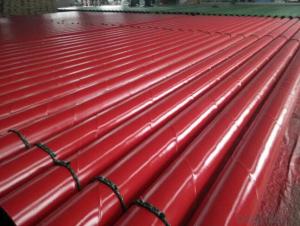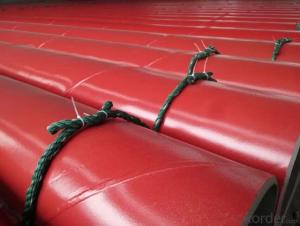seamless and welded steel pipe external coating
- Loading Port:
- China Main Port
- Payment Terms:
- TT OR LC
- Min Order Qty:
- -
- Supply Capability:
- -
OKorder Service Pledge
OKorder Financial Service
You Might Also Like
Specifications
water pipeline inner-layer tape
1 Butyl rubber as adhesive
2. SGS test report and DVGW certificate
3. corrosion protection
water pipeline inner-layer tape
State-of-the-Art Pipeline Protection for All Climates & Environments
System description:
WATER PIPELINE Inner -layer tape also be called pipe wrap anti-corrosion tape, polyethylene wrap tape.
water pipeline Inner-layer tapeT100 is engineered to assure a high bond to the primed pipe surface with excellent conformability characteristics, aggressive adhesive for corrosion protection and repair of main line coatings.
Inner-layer tapeT100 series is cold applied tape coating system for corrosion protection of Oil, Gas, Petrochemical, and Waste Waterburied pipeline, pipe can be buried, also can be underground ,overhead ,onshore and offshore .
Structure of water pipeline inner wrap tape
The specification of the tape consists of two layers, adhesive layer and film backing
Adhesive: butyl rubber
Film backing: Special blend of stabilized polyethylene
Features & Benefits
Provides a permanent bond to the primed steel pipes surface and provides protection against chemical electrolytic corrosion for underground pipelines.
long term corrosion protection
Worldwide reference lists. Established in-ground history
High chemical resistance under service temperature.
Outstanding electric property and permanent adhesion.
Cold applied, No release liner. Makes installation fast and easy.
Complies with EN-DIN 30672 and AWWAC-214 international standards and also ASTM standards.
Be used for water pipeline corrosion protection
System Properties
Type | T138 | T 150 | T165 | T180 | T 250 | T265 | T280 | |
Thickness | 15mil 0.38mm | 20mil 0.508mm | 25mil 0.635mm | 30mil 0.762mm | 20mil 0.508mm | 25mil 0.635mm | 30mil 0.762mm | |
Backing | 9mil 0.229mm | 9mil 0.241mm | 10mil 0.25mm | 10mil 0.25mm | 15mil 0.38mm | 20mil 0.508mm | 25mil 0635mm | |
Adhesive | 6mil 0.152mm | 11mil 0.279mm | 15mil 0.381mm | 20mil 0.508mm | 5mil 0.127mm | 5mil 0.127mm | 5mil 0.127mm | |
When used for ductile iron pipes inner layer 980-20 or 980-25 and outer layer 955-20 or 955-25 are recommended. | ||||||||
Elongation | ³300% | ³400% | ||||||
Tensile Strength | 55 N/cm | 70 N/cm | ||||||
Color | Black | White | ||||||
Peel Adhesion to Primed Pipe | 33 N/cm | |||||||
Dielectric Strength | 30 KV | |||||||
Dielectric Breakdown | 26 KV/mm | |||||||
Cathodic Disbandment | 0.24 in radius 6.4 mm | |||||||
Water Vapor Transmission Rate | < 0.1% | |||||||
Volume Resistivity | 2.5 x 1015 ohm.cm | |||||||
Impact resistance | 5.5Nm | |||||||
Penetration Resistance | <15% | |||||||
Performance | AWWA C-209,ASTM D 1000,EN 12068 | |||||||
Order information
Length | 100ft(30 M),200ft(60 M),400ft(120 M),800ft(240 M) |
Width | 2’’(50mm),4’’(100mm),6’’(150mm),17’(450mm),32’’(800mm) |
- Q:Can steel pipes be used for underground water supply systems?
- Yes, steel pipes can be used for underground water supply systems. Steel pipes are durable, strong, and resistant to corrosion, making them suitable for underground applications. They can withstand high water pressure, provide efficient flow of water, and have a long lifespan. However, it is important to ensure that the steel pipes are properly coated and protected against corrosion to prevent any contamination of the water supply. Additionally, steel pipes are heavier than other materials, which may require additional support during installation. Proper maintenance and regular inspection are also crucial to identify any potential issues and prevent leaks or damage to the underground water supply system.
- Q:Are steel pipes affected by UV rays?
- Yes, steel pipes can be affected by UV rays. Over time, exposure to UV radiation can cause the steel to degrade and weaken. It can lead to surface oxidation, discoloration, and in extreme cases, structural damage. To prevent this, protective coatings or paint can be applied to shield the steel pipes from UV rays.
- Q:What are the factors affecting the price of steel pipes?
- There are several factors that can affect the price of steel pipes. These factors include: 1. Raw material costs: The price of steel pipes is heavily influenced by the cost of raw materials such as iron ore and coal. Fluctuations in these commodity prices can impact the overall cost of production and subsequently affect the selling price of steel pipes. 2. Supply and demand: Supply and demand dynamics play a significant role in determining the price of steel pipes. When there is a high demand for steel pipes and a limited supply, the prices tend to increase. Conversely, when there is an oversupply of steel pipes and low demand, prices may decrease. 3. Production and manufacturing costs: The cost of producing and manufacturing steel pipes can have a direct impact on their price. Expenses related to labor, energy, transportation, and equipment maintenance can all contribute to the overall cost of production and, in turn, affect the selling price. 4. Market competition: The level of competition in the steel pipe industry can also influence the price of steel pipes. If there are many manufacturers and suppliers competing for market share, prices may be more competitive. On the other hand, if there are fewer competitors, prices may be higher due to limited options. 5. Government policies and regulations: Government policies and regulations can have a significant impact on the price of steel pipes. Import tariffs, trade restrictions, and environmental regulations can all affect the cost of production and subsequently influence prices. 6. Currency exchange rates: Steel pipe prices can also be influenced by currency exchange rates. Fluctuations in exchange rates between countries can impact the cost of importing or exporting steel pipes, which in turn can affect their selling price. 7. Global economic conditions: The overall state of the global economy can impact the price of steel pipes. During periods of economic growth, demand for steel pipes may be higher, leading to increased prices. Conversely, during economic downturns, demand may decrease, resulting in lower prices. It is important to note that these factors can interact with one another and fluctuate over time, making the pricing of steel pipes a complex and dynamic process.
- Q:What kind of argon arc welding wire is used for 16Mn steel pipe?
- 16Mn steel belongs to carbon manganese steel, the content of carbon is about 0.16%, and the yield point is equal to 343MPa (strength grade is 343MPa). 16Mn steel alloy content is less, good weldability, welding generally without preheating. But because the 16Mn steel hardened tendency is slightly larger than the low carbon steel, so at low temperatures (such as winter outdoor operations) or welding in high rigidity, large thickness of the structure, in order to prevent the cold crack, need to take measures to preheat.
- Q:Can steel pipes be used for oil well casing?
- Yes, steel pipes can be used for oil well casing. Steel pipes are commonly used for oil well casing due to their strength, durability, and ability to withstand high pressure and extreme environmental conditions.
- Q:How do you prevent leaks in steel pipes?
- One effective way to prevent leaks in steel pipes is to apply a high-quality coating or lining to the pipes. This protective layer acts as a barrier, preventing corrosion and minimizing the chances of leaks. Regular inspection and maintenance are also crucial to identify any potential issues early on and address them promptly. Additionally, ensuring proper installation techniques, using durable and reliable fittings, and following industry standards can help minimize the risk of leaks in steel pipes.
- Q:Are steel pipes suitable for use in coastal areas?
- Yes, steel pipes are suitable for use in coastal areas. Steel is highly resistant to corrosion and can withstand the harsh environmental conditions typically found in coastal regions, such as saltwater spray and high humidity. Additionally, steel pipes offer excellent structural strength, making them well-suited for various applications including marine construction, offshore oil and gas platforms, and coastal infrastructure projects.
- Q:What is the diameter of the steel tube DN20?
- Usually the nominal diameter is nominal for cast iron pipe, steel pipe joints, concrete pipe pipe, seamless steel pipe does not use this notation (with diameter * wall thickness). With nominal diameter pipeline accessories, meaning with tube.
- Q:Are steel pipes suitable for underground nuclear waste storage?
- Steel pipes are not suitable for underground nuclear waste storage. While steel is a strong and durable material, it is not resistant to corrosion when exposed to certain types of nuclear waste. Over time, the radioactive materials can corrode the steel pipes, leading to potential leaks and contaminating the surrounding environment. Additionally, steel pipes are not designed to withstand the extreme temperatures and pressures that can occur in nuclear waste storage facilities. Therefore, alternative materials such as corrosion-resistant alloys or concrete are typically used for underground nuclear waste storage to ensure the containment and isolation of the hazardous materials.
- Q:How are steel pipes insulated to prevent freezing?
- Steel pipes are insulated to prevent freezing by wrapping them with insulation materials such as foam or fiberglass, which helps to maintain the temperature of the pipe and prevents the transfer of cold air. Additionally, pipes can be buried underground below the frost line to protect them from freezing temperatures.
1. Manufacturer Overview |
|
|---|---|
| Location | |
| Year Established | |
| Annual Output Value | |
| Main Markets | |
| Company Certifications | |
2. Manufacturer Certificates |
|
|---|---|
| a) Certification Name | |
| Range | |
| Reference | |
| Validity Period | |
3. Manufacturer Capability |
|
|---|---|
| a)Trade Capacity | |
| Nearest Port | |
| Export Percentage | |
| No.of Employees in Trade Department | |
| Language Spoken: | |
| b)Factory Information | |
| Factory Size: | |
| No. of Production Lines | |
| Contract Manufacturing | |
| Product Price Range | |
Send your message to us
seamless and welded steel pipe external coating
- Loading Port:
- China Main Port
- Payment Terms:
- TT OR LC
- Min Order Qty:
- -
- Supply Capability:
- -
OKorder Service Pledge
OKorder Financial Service
Similar products
New products
Hot products
Related keywords




























